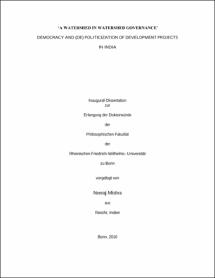'A watershed in watershed governance'democracy and (de) politicization of development projects in India

'A watershed in watershed governance'
democracy and (de) politicization of development projects in India

| dc.contributor.advisor | Gerke, Solvay | |
| dc.contributor.author | Mishra, Neeraj | |
| dc.date.accessioned | 2020-04-14T10:34:43Z | |
| dc.date.available | 2020-04-14T10:34:43Z | |
| dc.date.issued | 16.04.2010 | |
| dc.identifier.uri | https://hdl.handle.net/20.500.11811/4244 | |
| dc.description.abstract | This thesis studies the governance aspects (institutions and discourses) of donor-aided development programs in two integrated watershed development projects: 1) the Indo-German Watershed Development Program in Maharashtra (west India), and 2) the Integrated Watershed Development Project, Shiwalik Hills-II in Uttarakhand (north India). A watershed development project entails physical interventions for soil and water conservation measures (like building check dams, water absorption trenches, forestation, among others) and institutional interventions (like formation of village watershed committees, micro-credit societies, and forest protection committees, among others) in a specified location demarcated by the catchment area of a river or stream. It presents economic and socio-political data from the above-mentioned case studies to illustrate that the present governance strategies of the watershed development projects can be usefully analyzed from a ‘depoliticization’ perspective. Depoliticization can be described as a process in which previously political issues, people and institutions are becoming less political or nonpolitical. Habermas describes this process as the ‘decline of the public realm as a political institution’ that reduces the role of ‘citoyens’ to consumers, the public realm gets confined to spectacles and acclamations (Outhwaite, 1996). This implies that such issues, people and institutions are relocated from the arenas of democratic contestation and decision into the arenas which are governed by apolitical expert bodies, rules and regulations prescribed by non-negotiable scientific ‘facts’. In development studies, the concept has been used among others by Harriss (2002) and Ferguson (1990) to suggest that the developmental enterprise in the third world is based on a discourse propounded by international development agencies like World Bank, that relocates political issues of poverty and water scarcity in the list of technical problems to bypass the issues of contestation in democratic politics. Political decision-making in the sense of citizens critically discussing watershed policies, has been replaced by dominant groups persuading the public towards certain interventions and conclusions as observed in the cases. In this study, depoliticization has been further disaggregated under two categories: (i) preference-shaping depoliticization, and (ii) depoliticization of institutions and social organizations. These aspects are explored in detail with the help of empirical data from each case to locate the governance tactics of watershed development projects. Issues and institutions in this sense became the focal locations where the processes of governance were observed to be following certain techniques that could be problematized under the umbrella concept of depoliticization. In this study, depoliticization has been further disaggregated under two categories: (i) preference-shaping depoliticization, and (ii) depoliticization of institutions and social organizations. These aspects are explored in detail with the help of empirical data from each case to locate the governance tactics of watershed development projects. Issues and institutions in this sense became the focal locations where the processes of governance were observed to be following certain techniques that could be problematized under the umbrella concept of depoliticization. This thesis concludes that watershed governance in India is at the crossroads where it is undergoing a paradigm shift in the light of parallel transformations in the world democracy. This ‘shift’ has been characterized in the title of this thesis as ‘a watershed’ in Indian watershed governance. | en |
| dc.language.iso | eng | |
| dc.rights | In Copyright | |
| dc.rights.uri | http://rightsstatements.org/vocab/InC/1.0/ | |
| dc.subject.ddc | 320 Politik | |
| dc.title | 'A watershed in watershed governance' | |
| dc.title.alternative | democracy and (de) politicization of development projects in India | |
| dc.type | Dissertation oder Habilitation | |
| dc.publisher.name | Universitäts- und Landesbibliothek Bonn | |
| dc.publisher.location | Bonn | |
| dc.rights.accessRights | openAccess | |
| dc.identifier.urn | https://nbn-resolving.org/urn:nbn:de:hbz:5-20792 | |
| ulbbn.pubtype | Erstveröffentlichung | |
| ulbbnediss.affiliation.name | Rheinische Friedrich-Wilhelms-Universität Bonn | |
| ulbbnediss.affiliation.location | Bonn | |
| ulbbnediss.thesis.level | Dissertation | |
| ulbbnediss.dissID | 2079 | |
| ulbbnediss.date.accepted | 18.02.2010 | |
| ulbbnediss.fakultaet | Philosophische Fakultät | |
| dc.contributor.coReferee | Mollinga, Peter P. |
Files in this item
This item appears in the following Collection(s)
-
E-Dissertationen (712)




